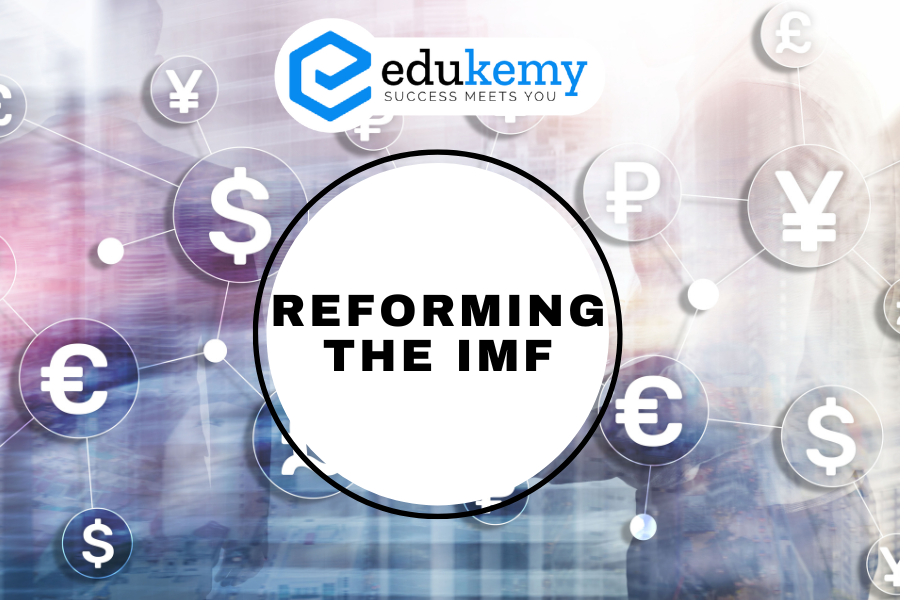
The International Monetary Fund (IMF) has faced criticism over various aspects, prompting calls for reforms. Some key issues and efforts for reform include:
- Leadership Selection:
- Critique:
- The Managing Director of the IMF has traditionally been from a European country, following an unwritten convention.
- Demand for Reform:
- India and other emerging markets advocate for breaking the geographical confinement and adopting a merit-based approach in selecting the Managing Director.
- Critique:
- Policy Approach:
- Critique:
- The IMF has been criticized for applying a one-size-fits-all policy, providing similar prescriptions to different countries regardless of their unique economic conditions.
- Demand for Reform:
- Calls for a more flexible and nuanced approach that considers the specific circumstances of each member country.
- Critique:
- Conditionalities and Social Spending:
- Critique:
- Conditionalities attached to IMF loans have been accused of demanding cuts in social sector spending, impacting vulnerable populations.
- Demand for Reform:
- Advocacy for more balanced conditionalities that do not disproportionately affect social welfare programs.
- Critique:
- Voting Rights and Representation:
- Critique:
- Emerging economies, including India, have called for greater recognition of their economic power through increased voting rights.
- Demand for Reform:
- Efforts to rebalance voting shares to reflect the changing global economic landscape.
- Critique:
- Surveillance Role:
- Critique:
- The IMF faced criticism for failing to predict the global recession in 2008-2009 despite its surveillance role.
- Demand for Reform:
- Calls for enhancing the effectiveness of surveillance mechanisms to better anticipate and address economic challenges.
- Critique:
- Post-Global Crisis Reforms:
- Actions Taken:
- Reforms have been implemented in response to the global financial crisis.
- Efforts to increase the representation of emerging markets in decision-making processes.
- Adjustments in voting shares to reflect changes in the global economy.
- Actions Taken:
- Ongoing Discussions:
- Continued Debate:
- Ongoing discussions and negotiations to address persistent concerns and improve the functioning of the IMF.
- Emphasis on inclusivity, transparency, and responsiveness to the diverse needs of member countries.
- Continued Debate:
- Adapting to Current Realities:
- Modernization Efforts:
- The IMF is continually working to modernize its policies and practices to align with the evolving global economic landscape.
- Modernization Efforts:
Reforming the IMF is an ongoing process aimed at making it more equitable, responsive, and effective in addressing the diverse challenges faced by its member countries.
FAQs
1. What is the IMF, and why does it need reform?
The International Monetary Fund (IMF) is a global financial institution established to promote international monetary cooperation, exchange stability, and balanced economic growth. Reform is necessary to adapt to changing global economic dynamics, ensure equitable representation of emerging economies, and enhance effectiveness in addressing financial crises.
2. How can the IMF enhance its governance structure?
The IMF can reform its governance structure by increasing the representation of emerging economies in decision-making processes. This could involve revising voting rights to reflect current economic realities, providing more seats on the Executive Board for underrepresented regions, and improving transparency in decision-making.
3. What role does the IMF play in addressing economic inequality?
IMF reforms should prioritize addressing economic inequality by promoting policies that foster inclusive growth and mitigate the adverse effects of globalization. This includes supporting social safety nets, progressive taxation, and measures to reduce disparities in access to resources and opportunities among member countries.
4. How can the IMF better support developing countries?
The IMF can better support developing countries by providing tailored assistance that prioritizes long-term development goals over short-term stabilization. This includes emphasizing investments in education, healthcare, infrastructure, and productive sectors to foster sustainable economic growth and reduce poverty.
5. How can the IMF improve its crisis response mechanisms?
To enhance crisis response mechanisms, the IMF should streamline conditionality, ensure adequate financial resources are available promptly during crises, and promote greater coordination with other international institutions. Additionally, the IMF should prioritize building capacity in member countries to prevent and manage crises effectively.
In case you still have your doubts, contact us on 9811333901.
For UPSC Prelims Resources, Click here
For Daily Updates and Study Material:
Join our Telegram Channel – Edukemy for IAS
- 1. Learn through Videos – here
- 2. Be Exam Ready by Practicing Daily MCQs – here
- 3. Daily Newsletter – Get all your Current Affairs Covered – here
- 4. Mains Answer Writing Practice – here

